
Faulkton is a city in and county seat of Faulk County,South Dakota,United States. The population was 826 at the 2020 census. The city's nickname is "The Carousel City".
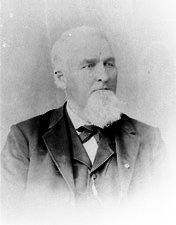
Alonzo Jay Edgerton was a United States senator from Minnesota and a United States district judge of the United States District Court for the District of South Dakota.

Granville Gaylord Bennett was an American lawyer who served as a justice of the Supreme Court for the Dakota Territory and as a delegate to the United States House of Representatives. He was the presiding judge at the trial of Jack McCall for the Aug. 2,1876 murder of Wild Bill Hickok in Deadwood,Dakota Territory. This trial was held in Yankton,the then headquarters of the Territory. Judge Bennett later was assigned to Lawrence county and moved his family there.
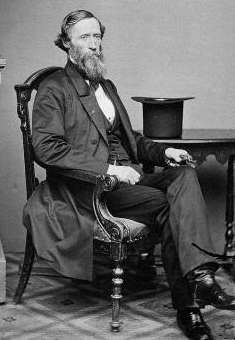
John Blair Smith Todd was a Delegate from Dakota Territory to the United States House of Representatives and a general in the Union Army during the American Civil War.

Robert Jackson Gamble was an American politician who served as a U.S. Representative and Senator from South Dakota. He was the father of Ralph A. Gamble and brother of John Rankin Gamble,members of South Dakota's prominent Gamble family.

George Miles Chilcott was a delegate to the United States House of Representatives from the Territory of Colorado,and a United States senator from the State of Colorado.

Coe Isaac Crawford was an American attorney and politician from South Dakota. He served as the sixth Governor and as a U.S. Senator.

John Rankin Gamble was a lawyer and politician from South Dakota. He was born in Alabama,New York in 1848,and was the brother of Robert J. Gamble and uncle of Ralph Abernethy Gamble.

Eben Wever Martin was an American attorney and politician in South Dakota. A Republican,he was most notable for his service as a member of the United States House of Representatives during the early 20th Century.

Joseph Barton Elam,Sr.,was a two-term Democratic U.S. representative for Louisiana's 4th congressional district,whose service corresponded with the administration of U.S. President Rutherford B. Hayes.
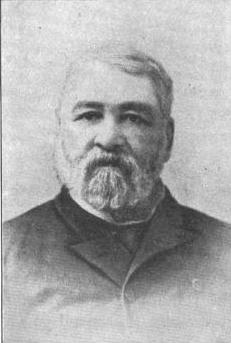
John Fitch Kinney was a prominent American attorney,judge,and Democratic politician. He served as Justice of the Supreme Court of Iowa,twice as Chief Justice of the Supreme Court of the Territory of Utah and one term as the Territory of Utah's Delegate in the House of Representatives of the 38th Congress.
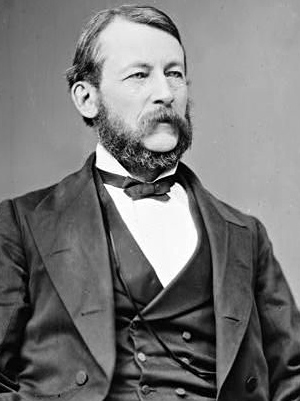
John Adam Kasson was a nineteenth-century lawyer,politician and diplomat from south-central Iowa. Elected to the U.S. House six times,he repeatedly interrupted his congressional service to serve in the Diplomatic service in many different capacities.
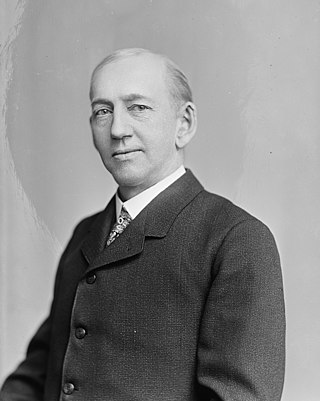
Charles Quincy Tirrell was a lawyer,educator,and U.S. Representative from Massachusetts.

John Parsons Cook was an American lawyer and politician affiliated with the Whig Party who represented Iowa's 2nd congressional district in the United States House of Representatives from 1853 to 1855.

Andrew Jackson Harlan was a U.S. Representative from Indiana and later a member of the Missouri House of Representatives. He was a cousin of Aaron Harlan.

John Edwards was an American Civil War brigadier general in the Union Army,an American politician and a U.S. Representative from Arkansas. He served in Congress for less than a year before being removed from office following allegations of fraud in his 1870 election. Edwards also served in both houses of the Indiana General Assembly and was a member and speaker of the Iowa House of Representatives.

Timothy Davis was an attorney,businessman,and politician in Missouri and Iowa. He is most notable for his service as a one-term U.S. Representative from Iowa's 2nd congressional district.
The Minnesota Territorial Legislature was a bicameral legislative body created by the United States Congress in 1849 as the legislative branch of the government of the Territory of Minnesota. The upper chamber,the Council,and the lower chamber,the House of Representatives,first convened on September 3,1849. The two chambers served as the territory's legislative body until Minnesota was admitted as a state on May 11,1858,when the Territorial Legislature was replaced by the Minnesota Legislature.
The Maj. John A. Pickler Homestead,also known as the Pickler Project,is a historic house. It was listed on the National Register of Historic Places in 1973. It located on the south edge of the city of Faulkton,South Dakota.

Women's suffrage started in South Dakota when it was part of Dakota Territory. Prior to 1889,it had a shared history of women's suffrage with North Dakota. While South Dakota was part of the territory,women earned the right to vote on school related issues. They retained this right after it became a separate state. The state constitution specified that there would be a women's suffrage amendment referendum in 1890. Despite a large campaign that included Susan B. Anthony and a state suffrage group,the South Dakota Equal Suffrage Association (SDESA),the referendum failed. The state legislature passed additional suffrage referendums over the years,but each was voted down until 1918. South Dakota was an early ratifier of the Nineteenth Amendment,which was approved during a special midnight legislative session on December 4,1919.



















